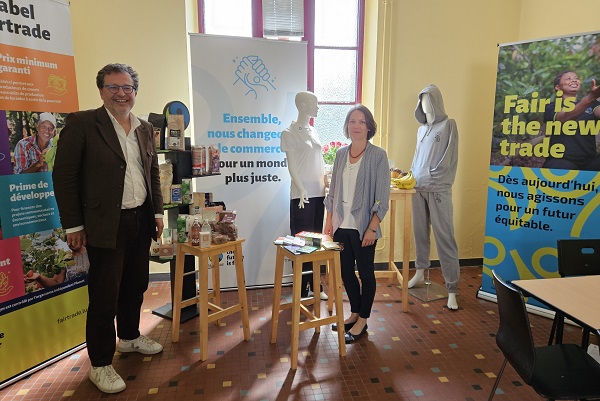 (L-R) Jean-Louis Zeien, President of Fairtrade Lëtzebuerg; Geneviève Krol, Director of Fairtrade Lëtzebuerg;
Credit: Jazmin Campbell, Chronicle.lu
(L-R) Jean-Louis Zeien, President of Fairtrade Lëtzebuerg; Geneviève Krol, Director of Fairtrade Lëtzebuerg;
Credit: Jazmin Campbell, Chronicle.lu
At a press conference held on Tuesday 29 July 2025, Fairtrade Lëtzebuerg President Jean-Louis Zeien and Director Geneviève Krol presented the non-profit organisation's key figures for 2024.
They highlighted continued growth in fair trade despite mounting global pressures on producers and ongoing economic uncertainty.
The speakers began by placing the 2024 results in a broader geopolitical context, notably amid a rollback in development cooperation and a growing prioritisation of competitiveness over sustainability. As Jean-Louis Zeien explained, producers in Africa, Asia, Latin America and the Caribbean are facing an "accumulation of interconnected crises": intensifying extreme weather events, price instability, and adaptation to new European legislation, such as the EU Deforestation Regulation.
Geneviève Krol noted that despite global uncertainty, Luxembourg consumers maintained a high level of engagement with fair trade. In 2024, average annual per capita spending on Fairtrade-certified products reached €85 (a €6 increase compared to 2023), placing the country behind only Switzerland (€120) and ahead of Germany and France. Total turnover from Fairtrade-certified sales in Luxembourg reached €57.2 million, a year-on-year growth of 10%.
Fairtrade Lëtzebuerg also highlighted market expansion and product diversification: 5,907 Fairtrade-certified products were available on the Luxembourg market in 2024 (+13% compared to 2023), including 657 new references. The majority (60%) also carried the organic (Bio) label. 30 Luxembourg-based companies are now certified Fairtrade partners, with three new actors joining in 2024: Kichelcher.lu, CafeTree Coffee Truck & Roastery and La Provençale.
The organisation also works with "multipliers" across the country, including 38 municipalities, 26 Fairtrade Schools and nine other certified organisations with the "ONLY" distinction (only serving Fairtrade products).
This year's presentation focused on three key sectors: cocoa, cashew nuts and cotton (the "Triple C").
In 2024, 611.24 tonnes of Fairtrade cocoa were used in chocolate products sold in Luxembourg (+11%). Fair trade remains crucial in countries such as Ghana, where child labour persists. Fairtrade premiums support the construction of schools and other infrastructure to reduce these risks. Among the top ten contributors to cocoa sales were three Luxembourgish companies: Luxlait, Jos & Jean-Marie and the Ateliers du Tricentenaire.
Fairtrade cashew nuts, introduced at the end of 2023, gained traction: 3,180 kg were sold in 2024 (+48%), with 78.8% certified organic. The Ateliers du Tricentenaire alone accounted for 76.5% of this market.
Moreover, 41.9 tonnes of cotton were sold in Luxembourg in 2024 (+17%). Local player AKABO played a key role, supplying "fair workwear" to both private companies and public actors (e.g. City of Luxembourg, Dussmann and Restopolis). These efforts were supported through the "Rethink Your Clothes" campaign, implemented by Fairtrade Lëtzebuerg. Notably, 84.3% of Fairtrade cotton sold was also organic.
Other key Fairtrade products in 2024 included:
- Bananas: over 2,283 tonnes sold (+11%), with one in three bananas sold in Luxembourg being Fairtrade-certified. 94.6% also carried the organic label.
- Coffee: 457.37 tonnes sold (down 5% due to reduced purchases from certain foreign sublicensees); 80% certified organic. Fairtrade coffee now holds 11.35% of the market, with four of the top ten brands sold in Luxembourg produced by local actors.
- Tomatoes: 86.5 tonnes sold (+15%), distributed by a single Luxembourg actor. This relatively young product is seen as having an emancipatory role for women working in the sector, with some Fairtrade-funded facilities enabling access to childcare. "A tomato is more than a tomato," noted Jean-Louis Zeien.
- Roses: Nearly 1.27 million stems sold (-35%, a drop attributed to strategic decisions by international players).
- Rice: 41.86 tonnes sold (-21%, reflecting a drop in sales among foreign commercial licensees).
- Sugar: 194.76 tonnes sold (-4%, a drop linked to a decline in activity of certain international players).
- Tea: 2.54 tonnes sold (+10%).
- Gold: sales rose by 75.3%, driven notably by Spuerkeess (BCEE) and two local jewellers working with Fairtrade gold sourced from Peru.
- Cold drinks: 123,433 litres sold (+11%).
- Wine: sales up 63%, thanks mainly to Belgian partners operating in Luxembourg.
Beyond product sales, Fairtrade Lëtzebuerg has remained actively engaged in political advocacy, pushing for stronger EU legislation that protects the rights of producers and workers, as well as the environment. The organisation said it would closely monitor Luxembourg's MEPs in upcoming European Parliament votes on legislation such as the Corporate Sustainability Due Diligence Directive (CSDDD).
Looking at the wider Fairtrade movement, Fairtrade purchases made in Luxembourg support nearly two million producers and workers in 67 countries, including 397,000 women producers.
Looking ahead, Fairtrade Lëtzebuerg said it aims to expand product categories such as ice cream and biscuits, while strengthening existing supply chains, particularly in cocoa and cotton.
One of the key challenges identified by the speakers acknowledged was maintaining consumer and partner loyalty amid rising costs and shifting markets.
Nevertheless, Jean-Louis Zeien emphasised the need for economic systems that make fair and sustainable trade the norm. "Another way of doing business is possible," he stated. "The future is fair."








